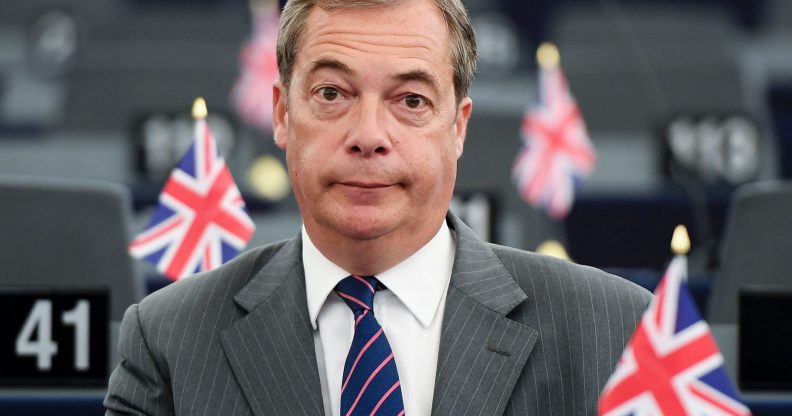Nigel Farage and Coutts bank: How ‘cancel culture’ lost all its meaning

Former leader of the UK Independence Party (UKIP) Nigel Farage has claimed his Coutts bank account was closed after it decided his views “do not align with our values”. (Frederick Florin / AFP / Getty Images)
Far-right politician Nigel Farage is on the warpath after claiming he was “cancelled” by Coutts bank, highlighting how far cancel culture has been taken away from its origins.
The former UKIP leader is at the centre of an extraordinary row over the closure of his account with the elite bank Coutts, which is also used by the royal family.
After Farage claimed his account was closed because of his political views, the BBC reported that the decision was taken due to Farage not having enough money. According to Coutts’ website, the bank requires clients to save at least £3 million or borrow – such as through a mortgage – or invest more than £1 million with them.
But on 19 July Farage announced he had obtained a 40-page document showing that his far-right views fuelled the decision.
According to the documents, parts of which were published by the Daily Mail, Coutts’ ‘Wealth Reputational Risk Committee’ had decided that banking Farage was not “compatible with Coutts given his publicly-stated views”, which the bank said were “at odds with our position as an inclusive organisation”.
The internal report described Farage as a “disingenuous grifter” who promotes “xenophobic, chauvinistic and racist views”. The Brexit campaigner called it a “prejudiced, nasty docucument”.
The BBC has apologised for its initial reporting. After intense backlash and political interventions, the CEO of Natwest, which owns Coutts, Dame Alison Rose, resigned on Wednesday (26 July).
The incident has fuelled fresh debate on “cancel culture” across newspapers, TV and on social media, with home secretary Suella Braverman claiming it has exposed the “sinister nature” of the “diversity, equity and inclusion industry”.
“If they can cancel me, they can cancel you,” Farage told the Daily Mail on 19 July, after publishing his dossier of evidence.
The government has announced that banks will be forced to “explain and delay” any decision to close client accounts, while the Financial Conduct Authority has also been ordered to launch a review of rules on how banks treat ‘politically exposed persons’ like Farage over the next two months.
What is cancel culture?
Farage using the language of cancel culture follows in a recent tradition of controversial figures, and their supporters, claiming to have been “cancelled” or “silenced” for their views.
The idea of ‘cancelling’ originated from Black Twitter and queer communities of colour around 2015, according to Meredith D. Clark of University of Virginia.
‘Cancelling’ people, places and entities was a light-hearted reaction to show distaste, but this was quickly “seized upon by outside observers particularly journalists with an outsized ability to amplify the(ir own) white gaze”, Clark wrote in a 2020 research article.
“Politicians, pundits, celebrities, academics, and everyday people alike have narrativized being canceled into a moral panic akin to actual harm, adding a neologic twist on the origin of the practice by associating it with an unfounded fear of censorship and silencing,” Clark added.
In the same way that ‘woke’ has been weaponised against minority groups, the idea of cancel culture is now brandished as a weapon by many who, ironically, find themselves with larger platforms as a result of their alleged silencing.
In 2021, Kathleen Stock resigned from her role at the University of Sussex after students called to have her sacked over her trans-exclusionary views.
Stock, who was little-known outside of academic and gender-critical circles at the time, subsequently found herself in newspapers and on television discussing how she had been villainised.
This included an interview on Lorraine Kelly’s ITV morning chat show Lorraine, during which Kelly challenged this narrative.
Kelly said: “Again, with the cancel thing … You’re talking to me, you’ve been on Woman’s Hour. Your book’s been reprinted. You actually, in a way, have more of a voice now than you probably did before.”
Many commentators have accused the LGBTQ+ community of “cancelling” JK Rowling for her own gender critical views.
The author has said she doesn’t consider herself cancelled, but once joked: “The only time I’ve ever made reference to being cancelled, my book sales went up.”
Rowling’s 2022 novel The Ink Black Heart is centred around a public figure who gets ‘canceled’ for being anti-trans.
In the US, comedian Chris Rock has spoken about being cancelled following criticism of his Netflix special The Closer for its transphobic content.
After a sold-out how at LA’s Hollywood Bowl, Rock raved to a standing ovation: “If this is what being canceled is like, I love it.”
How did this story make you feel?

